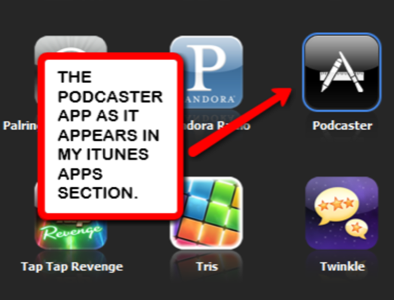Over the weekend, a debateraged across the tech blogosphere concerning the risks involved in developing for the iPhone platform.

What prompted the debate in the first place was Apple’s decision to reject an app known as the Podcaster, which would have permitted you to listen to podcasts without first downloading them in iTunes. Because the app “duplicates the functionality of the Podcast section of iTunes,” says Apple, they decided to reject it from inclusion in the App store.
To get around what many people consider to be an unfair ban, Alex Sokirynsky, the developer of the Podcaster app, decided to utilize a little-known feature of the iPhone/iPod Touch: “Ad Hoc App Distribution.” This largely unknown feature allows any developer to distribute apps themselves, without using the App Store to do so.
Unfairly Rejected?
On almerica.blogspot.com, Sokirynsky wrote how he doesn’t understand why Apple can reject his app for duplicating iTunes functionality when similar apps do the same. Specifically he mentions how any calculator app duplicates the functionality of the Apple calculator. Yet what’s even more strange, he notes, is the fact that there are already several apps that allow you to listen to a podcast outside of iTunes. For example, popular apps like Diggnation and Mobility Today are designed just for streaming podcasts. Those apps are not banned from the App Store, so why is his?
Working Around Apple: Ad Hoc Distribution
Designed for use in the enterprise environment, Ad Hoc distribution was created so I.T. departments would have the option to distribute apps from their company’s own servers. This allows a business to maintain security and save on external bandwidth, while making it simpler to update and remove apps from users’ phones. In order to utilize this method for distribution, a developer needs to register 100 iPhones and/or iPod Touch devices.
Obviously, an app distributed this way will have less chance for success than one made publicly available in the App Store, but it appears to be not only a perfectly viable workaround for getting past the Apple censors, but a perfectly legal one as well.

How To Sign Up For Podcaster
Alex has set up a web page at www.nextdayoff.com where he’s signing up those interested in downloading the app. Here you must enter your email address and UDID as the first step in the Ad Hoc distribution process. The UDID, or Unique Data Item Description, is available from within iTunes. To see your UDID, you have to click on the word “serial number” which displays beside the picture of your iPhone/iPod Touch when it’s connected. The UDID is a long string of alphanumeric characters which will appear in place of the serial number. You can copy this number to your clipboard by using “Ctrl + C” or “Command + C.”

After you enter your email address and UDID on the nextdayoff.com web page, you’ll receive a confirmation email within 24 hours. (Mine came much quicker – only minutes). Upon receiving confirmation, you can then return to the nextdayoff.com web page and re-enter your email address. At this point, you’ll be prompted to make a donation of $9.99, payable via PayPal. After the donation is received, you’ll receive an email with a download link to the application, which is distributed as a .zip file. Installation involves unzipping the files and dragging them to iTunes, but be sure to read the included instructions, especially if you’re a Windows user, as there are some technical details you’ll need to know.
Will Apple Shut This Down, Too?
Alex appears to be the first application developer who thought to use the Ad Hoc method to distribute a banned app. (If you know of others, please comment). However, given that Apple has confirmed the existence of a “kill switch,” we wonder if they will start using it to wipe banned, but distributed, apps such as this from our iPhones. If that’s the case, you can bet the uproar over that decision will be even greater than it was over the original ban.
It seems like Apple is stuck between the proverbial “rock and a hard place.” If they choose to ignore this, Ad Hoc distribution will almost certainly become the method of choice for distributing banned apps. But if they pull the “kill switch,” they could then potentially alienate their community of developers. What do you think Apple will do? Let us know your thoughts in the comments.
To learn more about what the Podcaster app does, you can view this video:

















